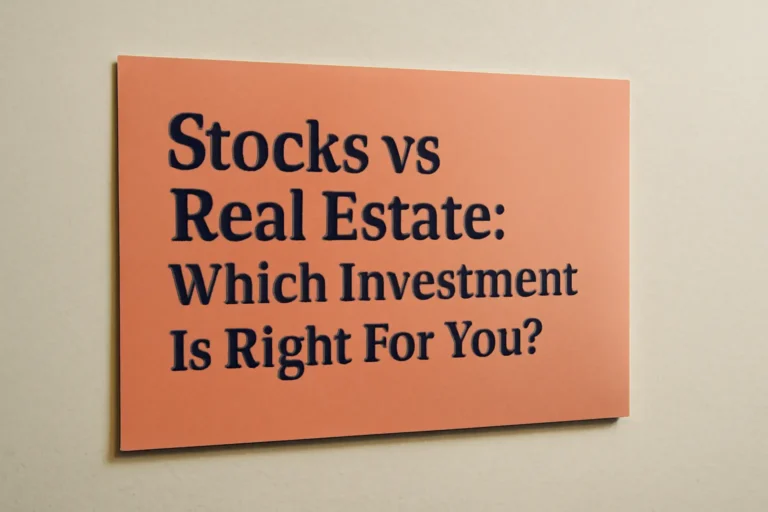
Stocks vs Real Estate: Which Investment Is Right For You?
Stocks vs Real Estate: Which Investment Is Right For You?
Is it better to invest in stocks or real estate? This blog will guide you through the key aspects of both investment types, helping you decide where to put your money for the long term.
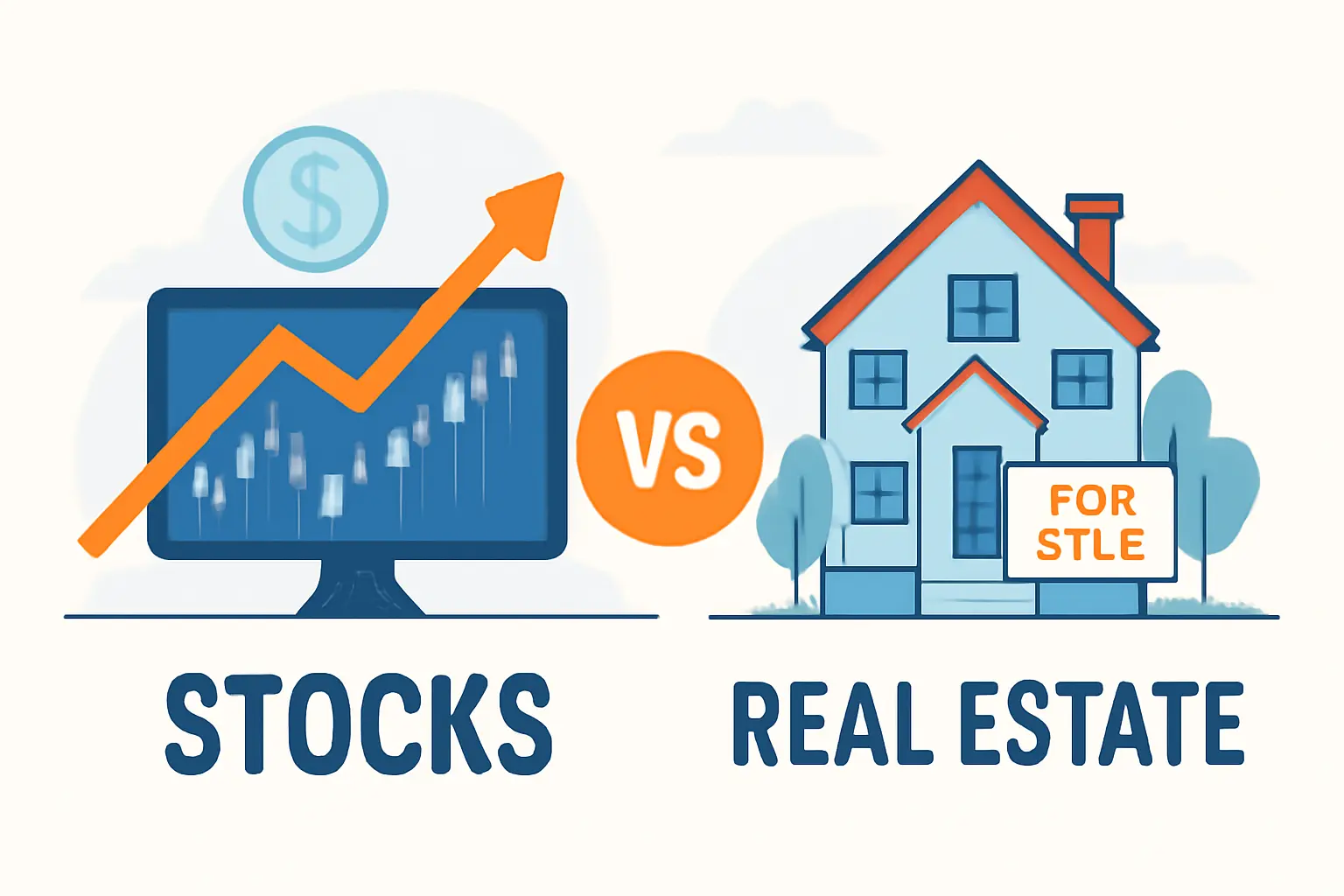
Summary
This blog compares the potential of stocks and real estate as investment vehicles. It will explore factors like market volatility, financial risks, tax implications, and long-term growth opportunities, to help you make an informed choice. Continue reading to see the pros and cons of each!
Stocks vs Real Estate: An Overview
Investing in stocks and real estate can offer substantial returns, but they come with very different risk profiles. Stocks tend to be more volatile and can experience rapid growth or decline depending on market conditions. Learning about stocks and understanding market dynamics is key to navigating this space effectively.
On the other hand, real estate investing is often seen as a more stable, long-term investment. While it offers fewer opportunities for short-term gains, real estate generally appreciates over time and can provide consistent income through rental properties.

Stocks as an Investment
Stocks are financial instruments that represent ownership in a company. They are traded on stock exchanges and their value fluctuates based on company performance and market conditions.
- Stocks offer high liquidity and can be bought and sold quickly.
- They have the potential for high returns, but come with significant volatility.
- Stock trading strategies can help mitigate risk.

Real Estate as an Investment
Real estate includes both residential and commercial properties that can appreciate over time. Many investors purchase properties to rent out, earning income while building equity as property values rise.
- Real estate offers more tangible ownership and can generate regular income through rent.
- It requires larger upfront capital and is less liquid than stocks.
- Real estate markets can vary significantly based on location and economic conditions. For more details, visit our guide on day trading for understanding market volatility.

Pros & Cons Comparison
| Stocks | Real Estate |
|---|---|
| High liquidity and ease of access | Less liquid, requires larger upfront investment |
| Potential for high short-term gains | Steady long-term appreciation |
| More volatile, higher risk | Stable, lower risk, but requires more capital |
Stocks as an Investment
Stocks are financial instruments that represent ownership in a company. They are traded on stock exchanges, and their value fluctuates depending on company performance, industry trends, and market conditions. Investing in stocks offers the potential for substantial growth, but it also comes with significant risks.
For example, stocks can yield high returns in short periods, but they are susceptible to market volatility. While some stocks are known for their stability, like blue-chip companies, others can experience dramatic fluctuations in value. Long-term investors often rely on diversified portfolios to mitigate risk.
Stocks also offer the advantage of liquidity. Investors can easily buy and sell stocks, especially when investing in widely traded companies. This means you can access your money faster than with real estate, which is less liquid.
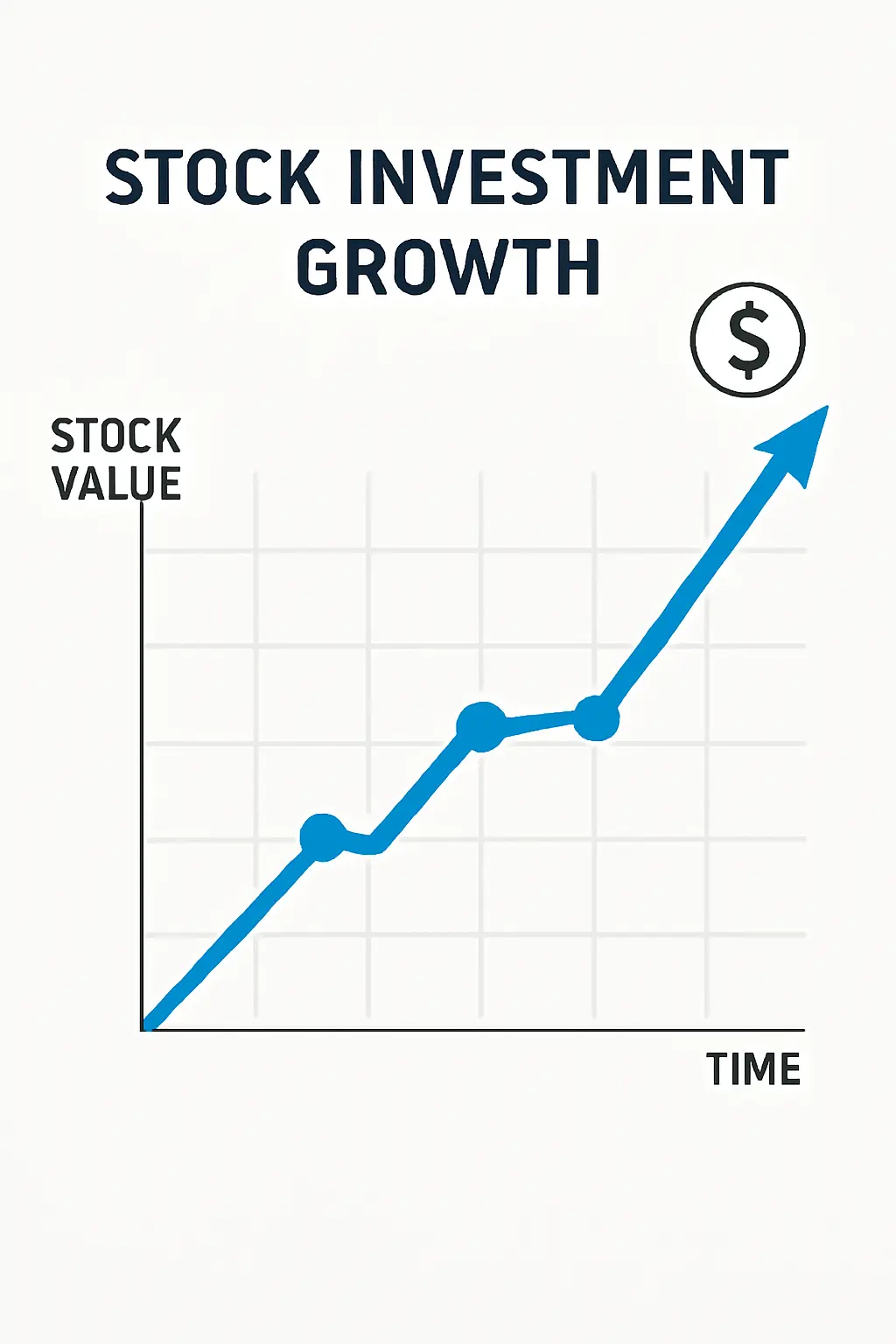
Real Estate as an Investment
Real estate investing typically involves purchasing property for rental income or capital appreciation over time. Properties can generate steady cash flow, especially in high-demand areas. However, compared to stocks, real estate often requires a larger initial investment.
Real estate markets can be affected by various factors, including location trends, interest rates, and economic growth. Real estate can be a safe haven during economic downturns, as demand for housing remains steady. However, unlike stocks, real estate is not liquid; selling property can take weeks or months, and transaction costs are higher.
Another advantage of real estate investing is the potential for leverage. You can use borrowed funds to finance a property purchase, which increases your return on investment if the property appreciates. For example, leveraging real estate can maximize your gains, but it also increases your exposure to risk.
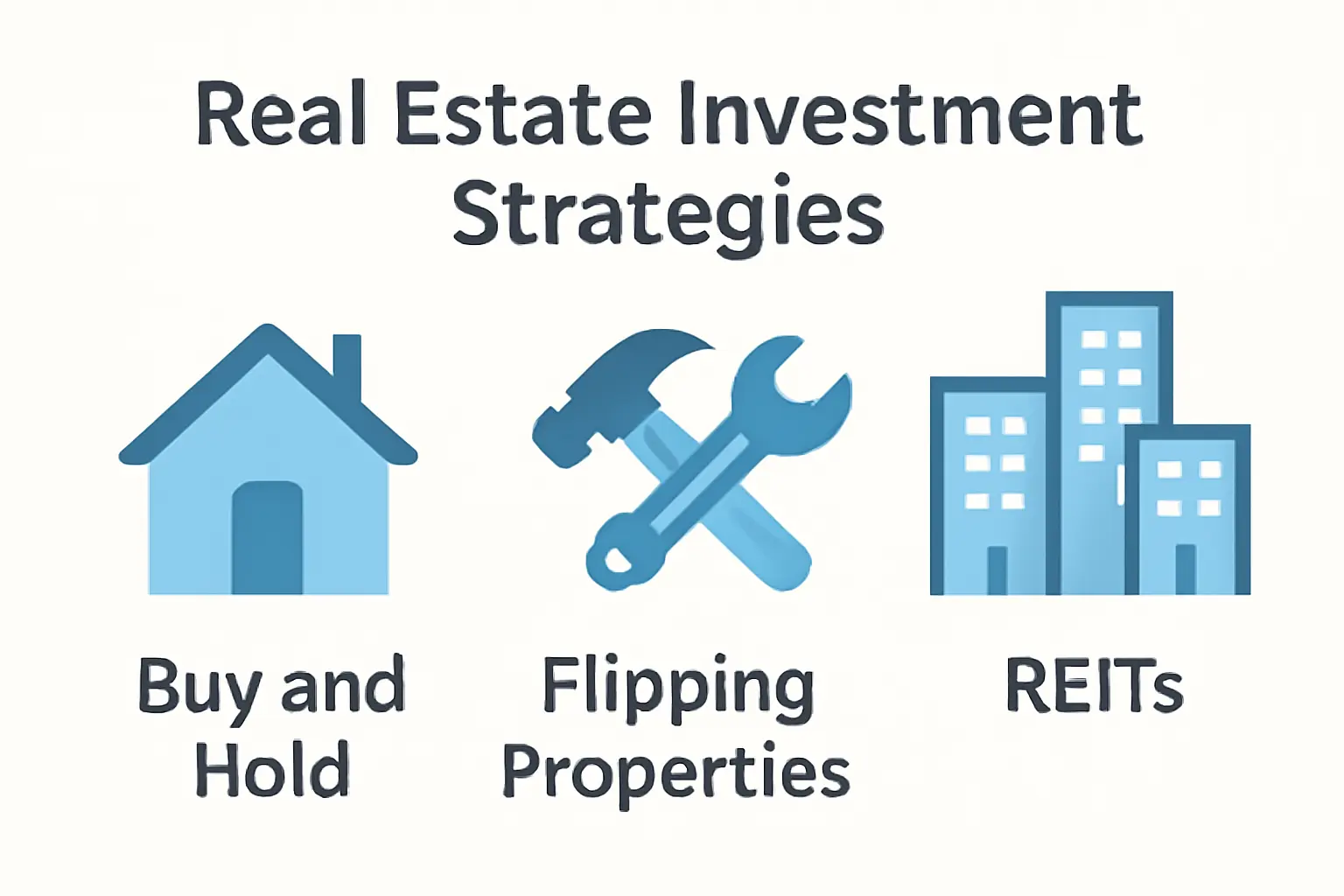
Financial Risks: Stocks vs Real Estate
Both stocks and real estate come with their respective financial risks. Stocks can be volatile, with market crashes occurring unexpectedly, as seen in historical downturns like the 2008 financial crisis. Conversely, real estate prices can fall due to factors like local market oversupply, environmental changes, or shifts in government policies.
One of the key risks in the stock market is market manipulation and insider trading. While these events are rare, they can cause a significant dip in stock prices. On the other hand, real estate investments face risks like maintenance costs, tenant turnover, and changes in local real estate laws.
Despite these risks, both asset classes have the potential for long-term growth. Diversifying your investment portfolio across stocks and real estate can help reduce the impact of these risks on your overall wealth.

Tax Implications: Stocks vs Real Estate
Taxation plays a major role in the profitability of any investment. When it comes to stocks, investors are typically taxed on capital gains when they sell their shares for a profit. The tax rate on capital gains can vary based on the holding period and income level of the investor. Short-term capital gains (for assets held for less than a year) are taxed at higher rates than long-term gains.
Real estate, on the other hand, has unique tax advantages. Property owners can benefit from deductions on mortgage interest, property taxes, and depreciation. In some cases, investors may be able to defer taxes by using a 1031 exchange, where profits from a sale are reinvested into a new property without triggering capital gains taxes.
However, both asset classes are subject to different rules, and consulting a tax professional is always advisable to navigate these complexities.

Stock Recommendations for Long-Term Growth
If you’re considering stocks for long-term investment, certain sectors have demonstrated consistent growth potential over the years. Some of the most popular industries include technology, healthcare, and energy. Below are a few top stock picks for investors looking for growth:
- Apple Inc. (AAPL): Known for its innovation in consumer electronics, Apple has consistently provided strong returns to its investors.
- NVIDIA Corporation (NVDA): With the rise of artificial intelligence and gaming, NVIDIA is positioned to see substantial growth in the coming years.
- Microsoft Corporation (MSFT): A leader in cloud computing and software development, Microsoft continues to expand its dominance in the tech industry.
- Amazon.com Inc. (AMZN): Despite market fluctuations, Amazon remains a key player in e-commerce and cloud services.
While stocks come with volatility, investing in companies with strong fundamentals and market presence is key to long-term success. Make sure to diversify your portfolio, and consider sectors with consistent growth patterns.

Frequently Asked Questions (FAQ)
Which is better: stocks or real estate?
There is no one-size-fits-all answer. It depends on your financial goals, risk tolerance, and investment horizon. Stocks are more liquid and offer higher short-term growth potential, while real estate provides stable long-term returns with less volatility.
Can you lose money in real estate?
Yes, real estate investments carry risk. Market downturns, poor property management, and unexpected expenses can lead to losses. However, with the right location and strategy, real estate is typically a stable, long-term investment.
How can I get started with investing in stocks or real estate?
Both investments require research and planning. For stocks, start by learning about the stock market, trading strategies, and risk management. For real estate, research local property markets, financing options, and rental strategies.
What are the tax benefits of investing in real estate?
Real estate investors can benefit from tax deductions. You can deduct mortgage interest, property taxes, and depreciation. Additionally, using strategies like the 1031 exchange can defer capital gains taxes when selling properties.

Conclusion: Stocks vs Real Estate – Which Is Right for You?
Both stocks and real estate offer compelling investment opportunities. Stocks are great for those looking for liquidity and high growth potential, while real estate provides stability and consistent returns, particularly in the long run. Ultimately, the best choice depends on your investment goals, time horizon, and risk tolerance.
It’s often recommended to diversify your portfolio by including both asset classes. By doing so, you can enjoy the benefits of both worlds while minimizing the risks associated with each investment type.
Take the time to research, understand the pros and cons, and make a decision that aligns with your financial strategy. Happy investing!
Investment Strategies: Maximizing Returns in Stocks and Real Estate
Whether you’re investing in stocks or real estate, having a well-thought-out strategy is key to success. Both investment types require a clear plan to maximize returns while minimizing risks. Here’s a look at some strategies for both asset classes:
Stocks
- Value Investing: This strategy involves investing in undervalued stocks that are trading below their intrinsic value. By analyzing financial reports and industry trends, investors look for stocks that have long-term potential, like Warren Buffett’s approach with Berkshire Hathaway.
- Growth Investing: Focused on investing in companies with strong growth potential. This strategy looks for fast-growing companies, typically in technology and innovation, like Apple or NVIDIA, and holds them for long-term appreciation.
- Dividend Investing: This strategy focuses on purchasing stocks that pay regular dividends. It’s ideal for investors looking for stable income, and it works well when combined with a long-term buy-and-hold approach.
Real Estate
- Buy and Hold: A long-term strategy where investors purchase properties and hold them for appreciation and rental income. Over time, property values rise, and tenants provide steady cash flow through rent.
- Flipping Properties: A short-term strategy where investors buy distressed properties, renovate them, and sell them at a profit. This requires knowledge of the local market and the ability to manage renovations effectively.
- Real Estate Investment Trusts (REITs): For those who want to invest in real estate without directly owning property, REITs offer a way to invest in property portfolios. They provide diversification and are liquid, unlike physical properties.

Risk Management: How to Protect Your Investments
Risk management is a crucial aspect of any investment strategy. Both stocks and real estate come with their own set of risks, and understanding how to mitigate them is essential for long-term success.
Stocks
- Diversification: By spreading investments across multiple sectors, you reduce the risk of any single investment negatively impacting your entire portfolio.
- Stop-Loss Orders: These orders allow you to automatically sell a stock if its price drops below a certain threshold, helping to limit losses.
- Hedging: Using options, such as put options, can protect against potential losses in volatile markets.
Real Estate
- Location Analysis: Thorough research on property location is crucial. Investing in growing neighborhoods with high demand ensures the property value appreciates.
- Insurance: Always ensure properties are adequately insured against natural disasters, theft, or other unexpected risks.
- Property Management: Hiring professionals to handle tenants, maintenance, and legal issues can help reduce risks and ensure a steady stream of income from rental properties.
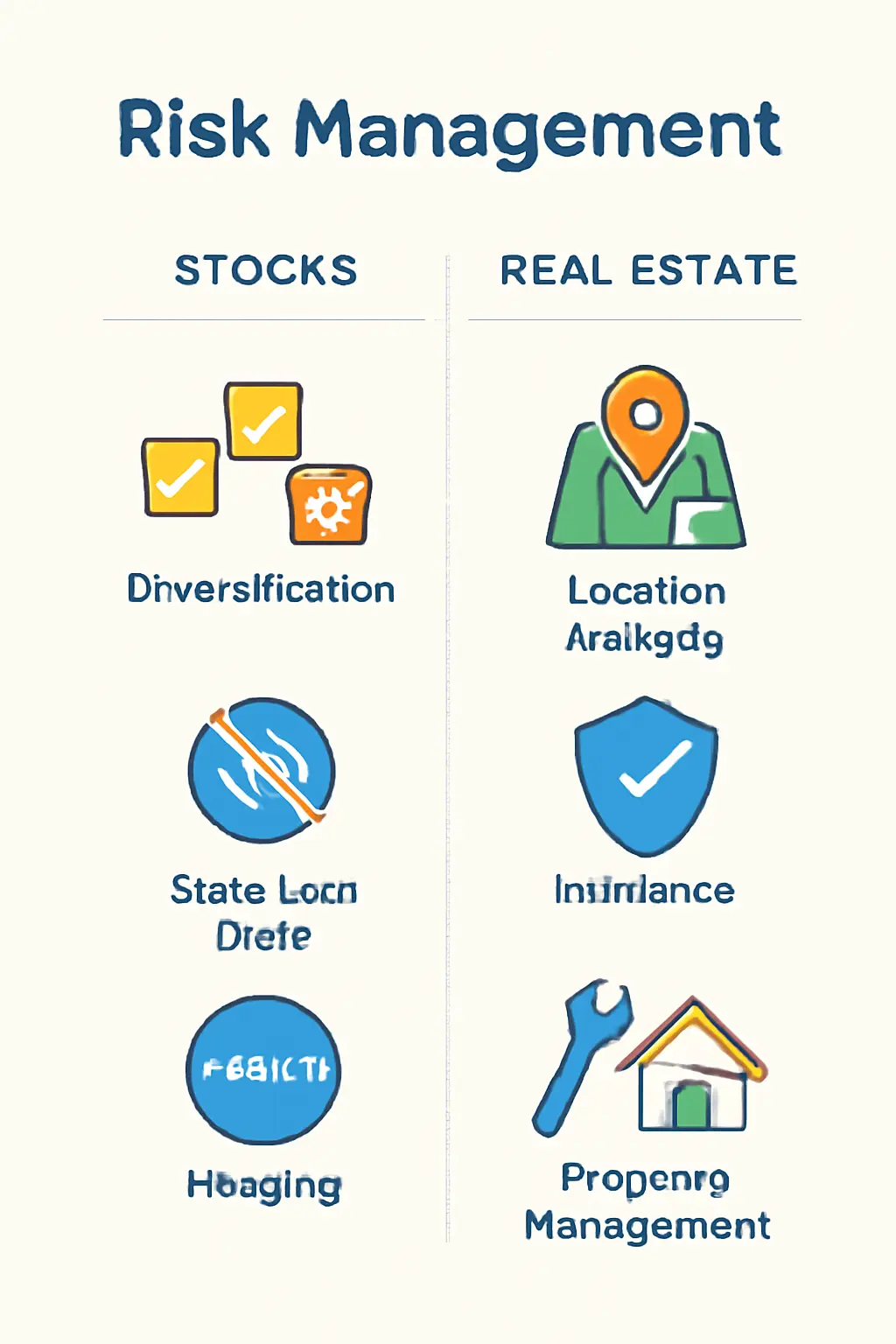
Future Outlook: Stocks vs Real Estate in the Coming Years
The future of both stocks and real estate looks promising, with emerging trends shaping the investment landscape. Understanding these trends can help investors make informed decisions about where to allocate their resources.
Stocks
The stock market is poised to benefit from advancements in technology, such as AI and automation. Sectors like renewable energy, electric vehicles, and biotechnology are expected to see significant growth. However, market volatility and geopolitical tensions may pose challenges for investors.
Real Estate
In real estate, the shift toward remote work and digital nomadism is changing demand for office and residential spaces. Properties in suburban areas or smaller cities are expected to see an increase in value as more people seek affordable housing options outside major urban centers. Additionally, the rise of green building and eco-friendly properties may become a significant trend in real estate investment.
